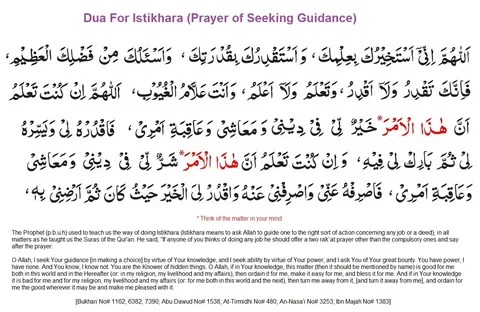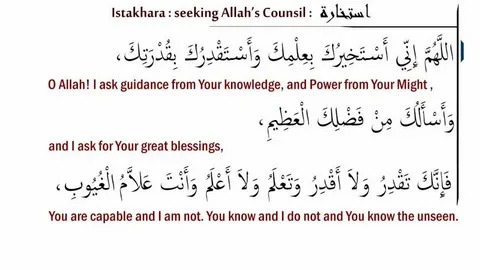Last Updated on September 29, 2023 by Arabian Tongue Team
In our journey through life, we often find ourselves facing critical decisions that can significantly impact our future. Whether it’s choosing a career path, a life partner, or making a major financial decision, we all seek guidance and clarity. In such moments of uncertainty, Muslims turn to a powerful and spiritually enriching practice known as “Dua e Istikhara.” In this article on Arabian Tongue website, we will delve into the significance, method, and importance of Dua e Istikhara, a heartfelt supplication for seeking guidance from the Divine.
What is Dua e Istikhara?

Dua e Istikhara, often referred to as the “Prayer for Seeking Guidance,” is a profound and deeply rooted Islamic practice. It is a means of seeking Allah’s guidance when faced with choices and dilemmas. The term “Istikhara” itself is derived from the Arabic root word “Khair,” which means goodness. Therefore, Dua e Istikhara essentially translates to seeking goodness or making the best choice.
Recommend: Virtues of Zikr
The Significance of Dua e Istikhara
dua e istikhara is a preaching of the claims that Muslims rely on in their recitation when making prayers The concept of asking God to be ashamed of a certain thing and its importance is as follows
- Dua e Istikhara holds immense significance in Islam as it signifies the believer’s trust in Allah’s wisdom and divine plan.
- It is a way to connect with the Creator and acknowledge His sovereignty in decision-making.
- By reciting this dua, Muslims express their reliance on Allah’s knowledge and wisdom, believing that He will guide them towards what is best for them.
Dua Istikhara Arabic
اللَّهُمَّ إِنِّي أَسْتَخِيرُكَ بِعِلْمَكَ وَأَسْتَقْدِرُكَ بِقُدْرَتِك وَأَسْأَلُكَ مِنْ فَضْلِكَ الْعَظِيم
فَإِنَّك تَقْدِر وَلَا أَقْدِر وَتَعْلَم وَلَا أَعْلَم وَأَنْت عَلَّام الْغُيُوب
اللَّهُمَّ إِنْ كُنْت تَعْلَم أَن هَذَا الْأَمْرخَيْر لِي فِي دِينِي وَمَعَاشِي وَعَاقِبَةِ أَمْري
فَاقْدُرْهُ لِي وَيَسِّرْهُ لِي ثُمَّ بَارِكْ لِي فِيه
وَإِنْ كُنْتَ تَعْلَم أَنَّ هَذَا الْأَمْر شَرٌّ لِي فِي دِينِي وَمَعَاشِي وَعَاقِبَةِ أَمْرِي
فَاصْرِفْهُ عَنِّي وَاصْرِفْنِي عَنْهُ وَاقْدُرْ لِيَ الْخَيْرَ حَيْث كَانَ ثُمَّ أَرْضِنِي بِه
Read more: Juz Amma Surahs List
Istikhara Dua Englsh Translation
“O, Allah! I ask guidance from Your knowledge, And Power from Your Might and I ask for Your great blessings. You are capable and I am not. You know and I do not and You know the unseen.
O, Allah! If You know that this ….. is good for my religion and my subsistence and in my Hereafter–(or said: If it is better for my present and later needs)–Then You ordain it for me and make it easy for me to get, And then bless me in it,
O, Allah! If You know that this …… is harmful to me In my religion and subsistence and in the Hereafter – (or said: If it is worse for my present and later needs) –Then keep it away from me and let me be away from it. And ordain for me whatever is good for me, and make me satisfied with it). The Prophet added that then the person should name (mention) his need”.
How to Perform Dua e Istikhara

Step-by-Step Guidance Performing Dua e Istikhara is a simple yet profound process. Here’s a step-by-step guide on how to do it:
Step 1: Make a Sincere Intention
Before starting the dua, ensure your intention is pure and sincere. You must genuinely seek Allah’s guidance and not be biased towards any specific outcome.
Read about: Facts About the Holy Quran
Step 2: Choose the Matter
Identify the specific decision you need guidance on. It could be related to marriage, career, travel, or any other aspect of your life.
Step 3: Recite the Dua
Recite the Dua e Istikhara, which begins with seeking Allah’s blessings upon Prophet Muhammad (peace be upon him) and then making your request for guidance.
Step 4: Trust Allah’s Decree
After reciting the dua, trust in Allah’s wisdom and His plan for you. Keep an open heart and mind, ready to accept the guidance that comes your way.
Best Time To Pray Salat Istikhara
Preferred Times: While Salat al-Istikhara can be prayed at any time, it is recommended to perform it during the last third of the night. This is a time when the Prophet Muhammad (peace be upon him) said that Allah descends to the lowest heaven, and during this time, your supplications are more likely to be accepted.
- State of Ablution (Wudu): Ensure that you are in a state of ritual purity (wudu) before performing Salat al-Istikhara.
- Make a Sincere Intention: Before beginning the prayer, make a sincere intention (niyyah) in your heart regarding the decision you are seeking guidance for.
- Recitation: In the first rak’ah (unit), after Surah Al-Fatiha, you can recite Surah Al-Kafirun (Chapter 109) and in the second rak’ah, after Surah Al-Fatiha, you can recite Surah Al-Ikhlas (Chapter 112). Alternatively, you can recite any verses from the Quran that you are comfortable with and that hold special meaning for you.
- Dua (Supplication): After completing the prayer, you can make the supplication (dua) of Istikhara, asking Allah for guidance and clarity in your decision. You can use your own words or a traditional Istikhara dua.
- Trust in Allah: After performing Salat al-Istikhara, trust in Allah’s wisdom and guidance. Pay attention to your heart and any signs or feelings that may come to you as you go about making your decision.
It’s important to remember that the purpose of Salat al-Istikhara is not necessarily to receive a clear and immediate answer in the form of a dream or sign. Rather, it is a means of seeking Allah’s guidance, and the decision-making process may still require careful consideration and consultation with others.
Additionally, it’s recommended to repeat the Salat al-Istikhara for up to seven days if you do not receive a clear answer or guidance initially. Ultimately, trust in Allah’s plan and wisdom in guiding you to the best decision for your life.
Learn Now: Learn Quran Online
FAQs
Is Dua e Istikhara only for Muslims?
Dua e Istikhara is an Islamic practice, but individuals from all faiths can seek divine guidance through their respective prayers or rituals.
Can I perform Dua e Istikhara for trivial decisions?
While it's recommended to reserve Dua e Istikhara for significant life decisions, there is no restriction on seeking guidance for smaller matters that may still hold personal importance.
How will I know if my Dua e Istikhara has been answered?
Allah may guide you through signs, dreams, or by making the decision feel right in your heart. It's important to trust your instincts and feelings.
Can I perform Dua e Istikhara multiple times for the same decision?
Yes, you can perform Dua e Istikhara multiple times if you continue to feel uncertain or receive no clear guidance.
Is Dua e Istikhara a substitute for personal effort and research in decision-making?
No, Dua e Istikhara complements personal effort. It is a means of seeking divine guidance while also applying your wisdom and knowledge to make informed decisions.
Conclusion
In a world filled with uncertainties and choices, Dua e Istikhara offers a divine compass to help navigate the turbulent waters of life. It reminds us of our profound connection with the Creator and our dependence on His wisdom. By following the steps and sincerely seeking guidance, believers can find solace in knowing that they are following the path ordained for them by the Most Merciful.

